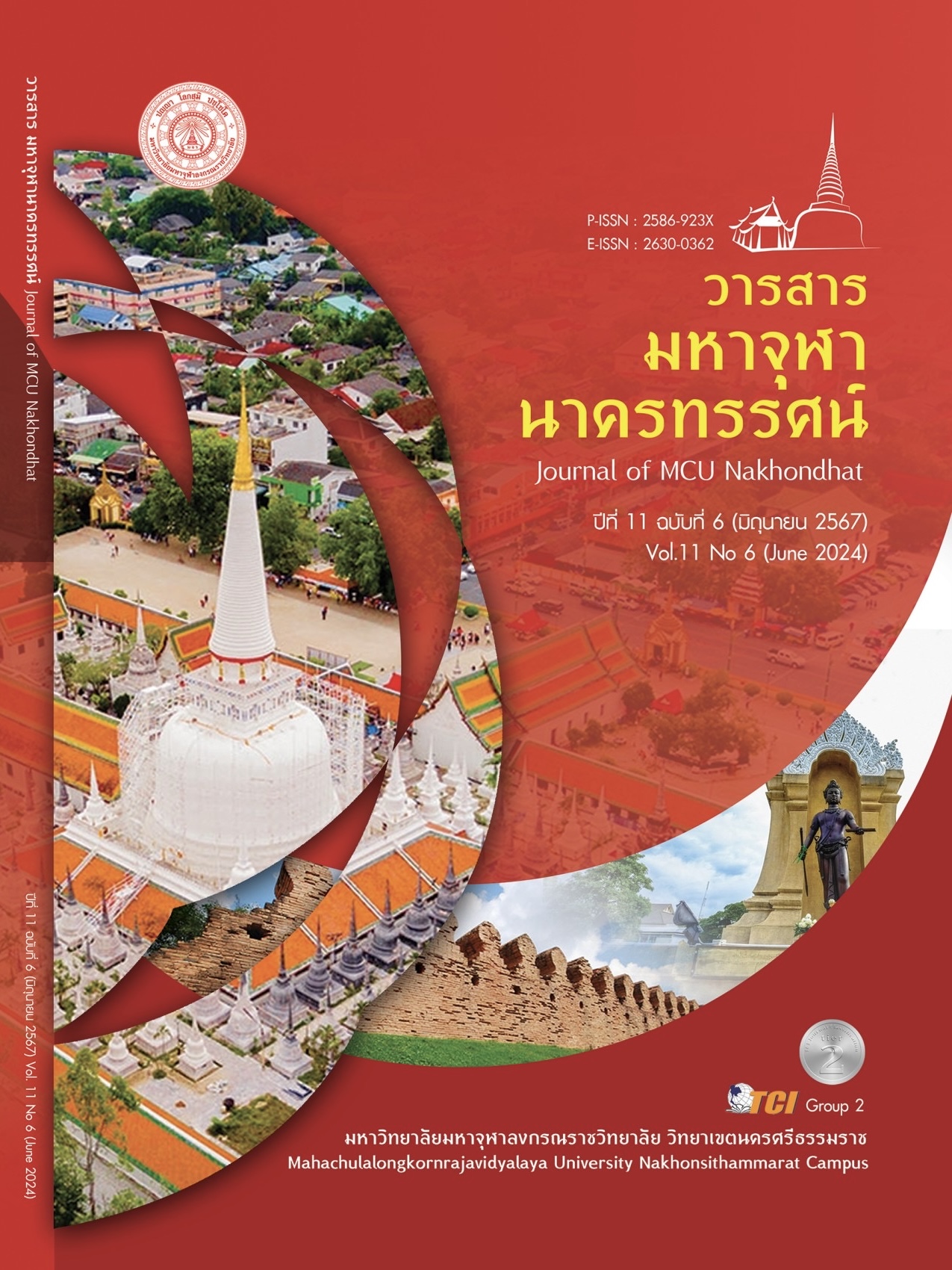RELATIONSHIPS BETWEEN TEAMWORK AND WORKING HAPPINESS OF TEACHERS UNDER TRANG PRIMARY EDUCATIONAL SERVICE AREA OFFICE 2
Main Article Content
Abstract
The aims of this study were to investigate teachers’ teamwork, teachers’ working happiness, the relationships between teachers’ teamwork and working happiness, and to examine problems with suggestions regarding teachers under Trang Primary Educational Service Area Office 2. This research was quantitative research. The sample consisted of 291 teachers under Trang Primary Educational Service Area Office 2, obtained from each district by proportional two-stage stratified random sampling and simple random sampling. The data gathering instrument was a five-point rating scale questionnaire. The statistics used for data analysis comprised mean, standard deviation, and Pearson’s correlation coefficient. The results revealed that 1) The teachers’ teamwork was found at a good level ( = 4.35, S.D. = 0.58). 2) The teachers’ working happiness was found at a high level. 3) There was a highly positive relationship between teachers’ teamwork and working happiness at .001 Level of Significance (r = .783) and 61.30 percent of the working happiness variance could be explained by Team working. (r2 = .613) 4) Some of the problems arose from teachers' disagreements and having few meetings for discussions. This made planning for various tasks and assignments unclear, resulting in the work not being achieved as expected. Therefore, consultation, exchange of opinions, and planned cooperation should be carried out to achieve successful and effective work results.
Article Details

This work is licensed under a Creative Commons Attribution-NonCommercial-NoDerivatives 4.0 International License.
References
กระทรวงศึกษาธิการ. (2542). พระราชบัญญัติการศึกษาแห่งชาติ พ.ศ. 2542. เรียกใช้เมื่อ 14 มกราคม 2566 จาก https://www.moe.go.th/backend/wp-content/uploads/2020/10/1
ทิวา มีรัตน์. (2562). ความสัมพันธ์ระหว่างการเสริมพลังอำนาจครูกับการทำงานเป็นทีมของครู ในโรงเรียนมัธยมศึกษาขนาดใหญ่และใหญ่พิเศษ จังหวัดชลบุรี สังกัดสำนักงานเขตพื้นที่การศึกษามัธยมศึกษา เขต 18. ใน วิทยานิพนธ์ปริญญาศึกษาศาสตรมหาบัณฑิต. สาขาการบริหารการศึกษา มหาวิทยาลัยเกษตรศาสตร์.
ธีระพล เพ็งจันทร์. (2555). การบริหารจัดการสถานศึกษา. อุดรธานี: มหาวิทยาลัยราชภัฏอุดรธานี.
สำนักงานเขตพื้นที่การศึกษาประถมศึกษาตรัง เขต 2. (2565). รายงานผลการดำเนินงานประจำปีงบประมาณ พ.ศ. 2565. เรียกใช้เมื่อ 18 กุมภาพันธ์ 2566 จาก http://trang2.go.th/index.php
สำนักงานคณะกรรมการพัฒนาการเศรษฐกิจและสังคมแห่งชาติ. (2560). แผนพัฒนาเศรษฐกิจและสังคมแห่งชาติ ฉบับที่ 12. เรียกใช้เมื่อ 18 กุมภาพันธ์ 2566 จาก https://www.nesdc.go.th/ewt_dl_link.php?nid=6422
Diener, E. (2003). Subjective Well-Being: The Science of Happiness and Life Satisfaction. The Oxford Handbook of Positive Psychology, 95(3), 187-189.
Manion, J. (2003). "Joy at work: Creating a positive workplace". Journal of Nursing Administration, 33(12), 652-655.
Martin, A. J. et al. (2005). The Role of Psychological Climate in Facilitating Employee Adjustment During Organizaionl Change. European Journal of Work and Organizational Psychology, 45(5), 263-289.
Tarricone, P. (2011). Successful teamwork: A case study New South Wales. Higher Education Research and Development Society of Australasia Inc, 25(1), 640-646.
Romig, D. (1996). Breakthrough Teamwork: Outstanding Result Using Structured Teamwork. Chicago: Irwin.
Travers, C. J. & Cooper, C. L. (1996). Teacher under Pressure Stress in Teaching Profession. Journal of Education for Teaching, 24(2), 190-191.


